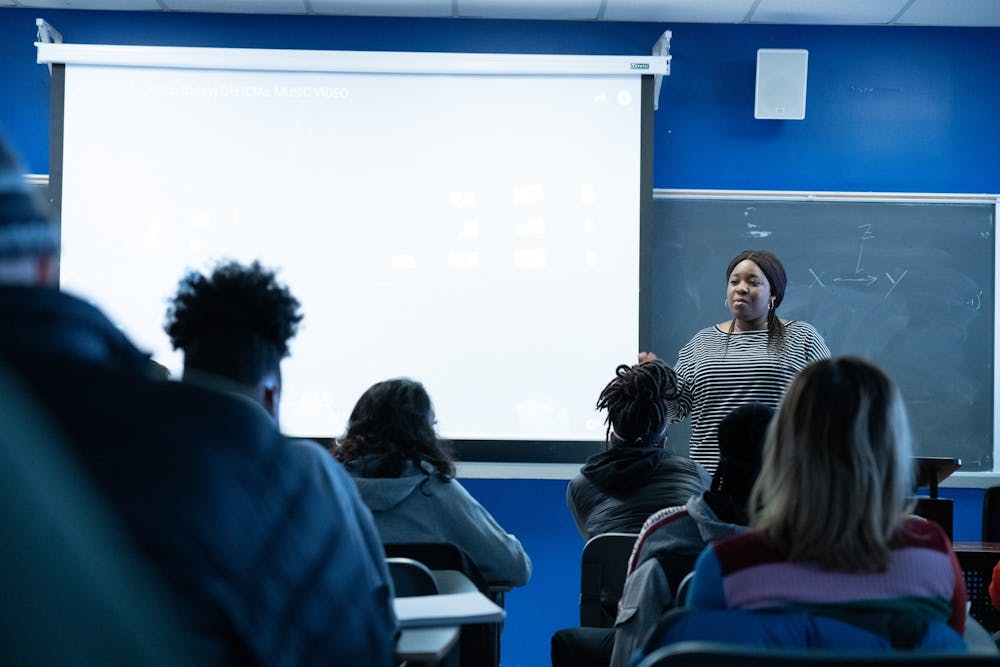Mopelolade Ogunbowale has dedicated her life to studying different cultures. And when she took over UB’s popular Hip Hop and Social Issues class, she decided to carry over her own international focus to teaching one of the world’s most popular genres.
Hip-hop originated in Brooklyn in the ‘70s, but Ogunbowale wants to teach her students that there is so much more to the genre than its American roots. Ogunbowale started teaching Hip Hop and Social Issues in spring 2018 and aims to take students out of their comfort zones, showing them an expanded world of hip-hop they may have never heard before. And she’s using her own experiences and studies to take them there.
Ogunbowale grew up in Lagos, Nigeria and her parents exposed her to outside cultures through travel and religious and political texts at an early age. She would read about black resistance politics and study the Quran, even while growing up in a Christian home.
Above all, she remembers seeing extreme wealth and extreme poverty “side by side” in Lagos, which inspired her to dedicate her college studies to the “cultural expressions of the urban poor.”
And after finishing her undergraduate studies in 2009, Ogunbowale enrolled in Canada’s University of Guelph to study history and international development. She remembers hearing professors talk about Africa in degrading ways, which hurt her.
“I was very upset, because even if those locations were poor, I lived there, and I saw our young musicians were trying to make good music, but also they were using music to display their own transnational connections,” Ogunbowale said. “They were materially poor, but they were culturally and intellectually rich because they were trying to learn history beyond their own location.”
Her advisor Dr. Cecil Foster, former Transnational Studies chair and current professor, encouraged her to come to UB to research different cultures. She wrote her dissertation at UB on African music and how it is influenced by the continent’s ideologies of religion, gender and sexuality. Ogunbowale began teaching Hip Hop and Social Issues, a class of 60 students, shortly after. Ogunbowale took over the class, which was created and made popular by Dr. Kush Bhardwaj, and now emphasizes the international influences of the genre, something she says wasn’t as much of a focus in previous years.
“If I was going to teach that class and make it very authentic, I had to teach it as an internationalist from the perspective of an outsider coming in,” Ogunbowale said. “Hip-hop is a global culture; everybody across the world looks to hip-hop.”
Clarence Mosley, a computer science major, says the class changed her perspective on hip-hop.
“First I thought of hip-hop as an art form of African American people but now I think of it as a collection of the voice of marginalized youth” Mosley said.
Ogunbowale doesn’t only teach her students the various current forms of hip-hop, such as grime in Britain, but also the genre’s roots. In her class, she teaches students about the Caribbean reggae and dancehall music of the ‘70s and how it paved the way for today’s hip-hop.
For Ogunbowale, it’s crucial to understand the history and politics of the countries she teaches about in order for students to learn about their hip-hop scenes.
“It’s a lot more research on my own part to jump around the world and make sure I know the story of this country and bring it to the class” Ogunbowale said.
And students agree that Ogunbowale’s approach to the class is enlightening.
“This class has given me the opportunity to view hip-hop outside the lenses of an American culture which I’ve been indoctrinated with my whole life,” said junior chemistry major Ade Thompson. “It has opened my eyes to how across the world, it’s been used to bring people together.”
But while not every student in the class ends up embracing hip-hop the way she does, Ogunbowale said the songs she plays in her class end up becoming some of her students’ favorites.
“At the end of the semester, if I don’t achieve anything else, at least they’ll have a larger playlist that includes artists all around the world,” Ogunbowale said.
The arts desk can be reached at arts@ubspectrum.com





